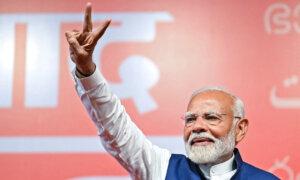HYDERABAD/NEW DELHI—Indian Prime Minister Narendra Modi’s National Democratic Alliance (NDA) formally named him on Wednesday to lead a new coalition government for a third straight term, a day after it regained power with a surprisingly slim majority.
Mr. Modi, a populist who has dominated Indian politics since 2014, will for the first time head a government dependent on the support of regional allies whose loyalties have wavered over time, which could complicate the new cabinet’s reform agenda.
A day after the humbling election outcome for his Bharatiya Janata Party (BJP), following a strong performance by the opposition “INDIA” bloc, Mr. Modi’s 15 alliance partners met at his New Delhi residence and named him as their leader.
The BJP-led NDA won 293 seats in the 543-member lower house of parliament, more than the simple majority of 272 seats needed to form a government. The INDIA alliance led by Rahul Gandhi’s Congress party won 230 seats, more than forecast.
Mr. Modi was set to meet President Droupadi Murmu on Friday to present his claim to form a government and the swearing-in could take place over the weekend, an NDA leader said on condition of anonymity because he was not authorized to speak to the media.
Local media earlier reported that the swearing-in ceremony was scheduled for Saturday.
Separately, leaders of the INDIA alliance that comprises over two dozen parties also met at the residence of Congress President Mallikarjun Kharge in Delhi.
“The INDIA bloc will continue to fight against the fascist rule of the BJP, led by Modi,” Mr. Kharge told reporters following the meeting. “We will take appropriate steps at the appropriate time to realize the people’s desire not to be ruled by the BJP’s government.”
Mr. Modi’s BJP won 240 seats on its own, trimming its 2019 tally by over 60 seats, mostly in rural areas, which investors say could impact land and labor reforms that they had expected would unlock value and growth.
Ratings agency Fitch said: “Despite the slimmer majority, we do expect broad policy continuity to persist, with the government retaining its focus on its capex push, ease of doing business measures, and gradual fiscal consolidation.”
The closer-than-expected election should increase the prospect of productive reforms, the country’s chief economic adviser said on Wednesday.








